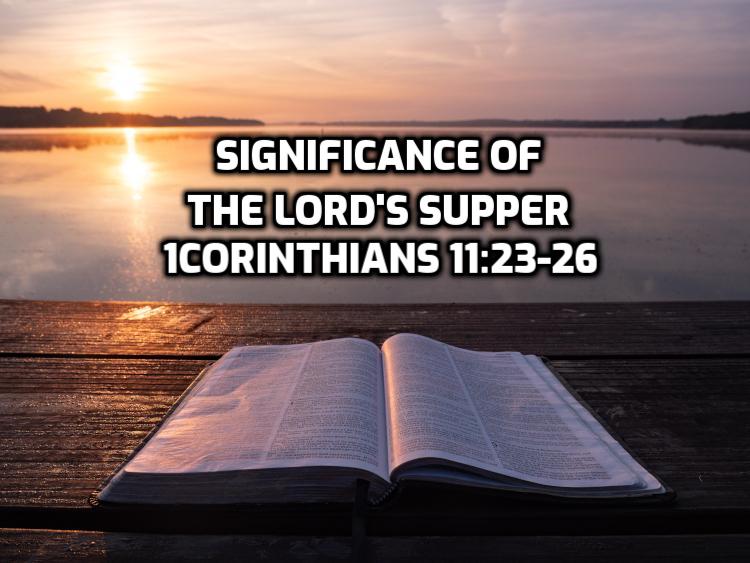What’s the connection between Passover and Communion? Why are we suppose to celebrate the Lord’s Supper? In this podcast, we look at how Paul explains the significance of the Lord’s Supper.
Review
In this section of the letter, Paul is responding to specific questions the Corinthians have asked him. Starting in chapter 11, the issues relate to how they are handling their worship services. First, he addressed the issue of whether or not married women should uncover their heads when they pray or teach. Next, he turns to how they are handling the Lord’s supper.
The Corinthian church was having a community meal and celebrating communion. But rather than celebrating as a community the church was dividing along class and economic lines.
Paul finds their actions particularly inappropriate because of what they are gathered together to do. Their actions reveal that the believe the opposite of what they ought to believe and calls into question why they are doing the ritual at all.
In 11:17-21 he gave us the specifics of the problem. In 11:22 he begins to explain why he’s so concerned.
Background
- Jesus and the twelve are celebrating the Passover on the last night before Jesus is crucified. Jesus takes the element of the Passover meal and reinterprets them for the disciples, instituting the Lord’s Supper.
- In order to understand the Lord’s supper, we first need to understand the Passover meal and how Jesus changed it.
11:4Moses said, “Thus says the LORD, ‘About midnight I am going out into the midst of Egypt, 5and all the firstborn in the land of Egypt shall die, from the firstborn of the Pharaoh who sits on his throne, even to the firstborn of the slave girl who is behind the millstones; all the firstborn of the cattle as well. – Exodus 11:4-5
- The descendants of Abraham are enslaved in Egypt. God sends a series of plagues and eventually the Egyptian Pharaoh agrees to let them leave.
- In the last plague, God tells the Israelites all the first born will die on a certain night, but they will be spared if they sacrifice a lamb and put some of its the blood on their doorposts (Exodus 12).
For our purposes, note the Passover involves forgiveness, deliverance and a covenant:
- God visited His judgment on the land but the Israelites were spared because of the blood of the sacrificial lamb.
- God delivered His people from slavery in Egypt.
- God inaugurated a covenant with the Israelites such that He would be their God and they would be His people.
12:14‘Now this day will be a memorial to you, and you shall celebrate it as a feast to the LORD; throughout your generations you are to celebrate it as a permanent ordinance. 15Seven days you shall eat unleavened bread. On the first day you shall remove leaven out of your houses, for if anyone eats what is leavened, from the first day until the seventh day, that person shall be cut off from Israel. 16On the first day you shall hold a holy assembly, and on the seventh day a holy assembly. No work shall be done on those days. But what everyone needs to eat, that alone may be prepared by you. 17You shall also observe the Feast of Unleavened Bread, for on this very day I brought your hosts out of the land of Egypt; therefore you shall observe this day throughout your generations as a permanent ordinance.’ – Exodus 12:14-17
The Passover meal was to remind them what God had done for them.
- They remember these events through the teaching during the meal.
- The meal has symbolic elements to remind them what God had done.
- The meal is an event they do together as the people of God.
Passage
11:23For I received from the Lord that which I also delivered to you, that the Lord Jesus in the night in which He was betrayed took bread; 24and when He had given thanks, He broke it and said, “This is My body, which is for you; do this in remembrance of Me.” 25In the same way He took the cup also after supper, saying, “This cup is the new covenant in My blood; do this, as often as you drink it, in remembrance of Me.” 26For as often as you eat this bread and drink the cup, you proclaim the Lord’s death until He comes. -1Corinthians 11:23-26
- Paul is a reliable witness even though he wasn’t there because the risen Jesus taught Paul what it meant.
We have the same 3 elements in Jesus’s death on the cross that we saw in the Passover: deliverance from judgment, freedom from slavery and the inauguration of a new covenant.
- God’s judgment is coming but His people will be spared because of the blood of Jesus Christ.
- God forgives sins and delivers His people from slavery to sin death and futility through Jesus.
- Through Jesus, God inaugurated a new covenant such that He would be our God and we would be His people.
- See Luke 22:14-20 and Matthew 26:26-28.
- See Jeremiah 31:31-34.
- See 1 Corinthians 5:7 and John 1:29
We are to remember Jesus death and what his death did for us through this ceremonial meal.
- The Lord’s Supper includes the specific teaching about what God has done through Christ.
- The Lord’s Supper has symbolic elements to remind us about what God done through Christ.
- The Lord’s Supper is an event we do together as the people of God because of what Christ has done for us.
For more detail and explanation, please listen to the podcast.
Next: 34 1 Corinthians 11:27-34 Taking communion in an unworthy manner
Previous: 32 1 Corinthians 11:17-22 Situation with Lord’s supper
Series: 1 Corinthians: Pride & Prejudice in the church
Study: 1 Corinthians Resources
Photo by Aaron Burden on Unsplash

